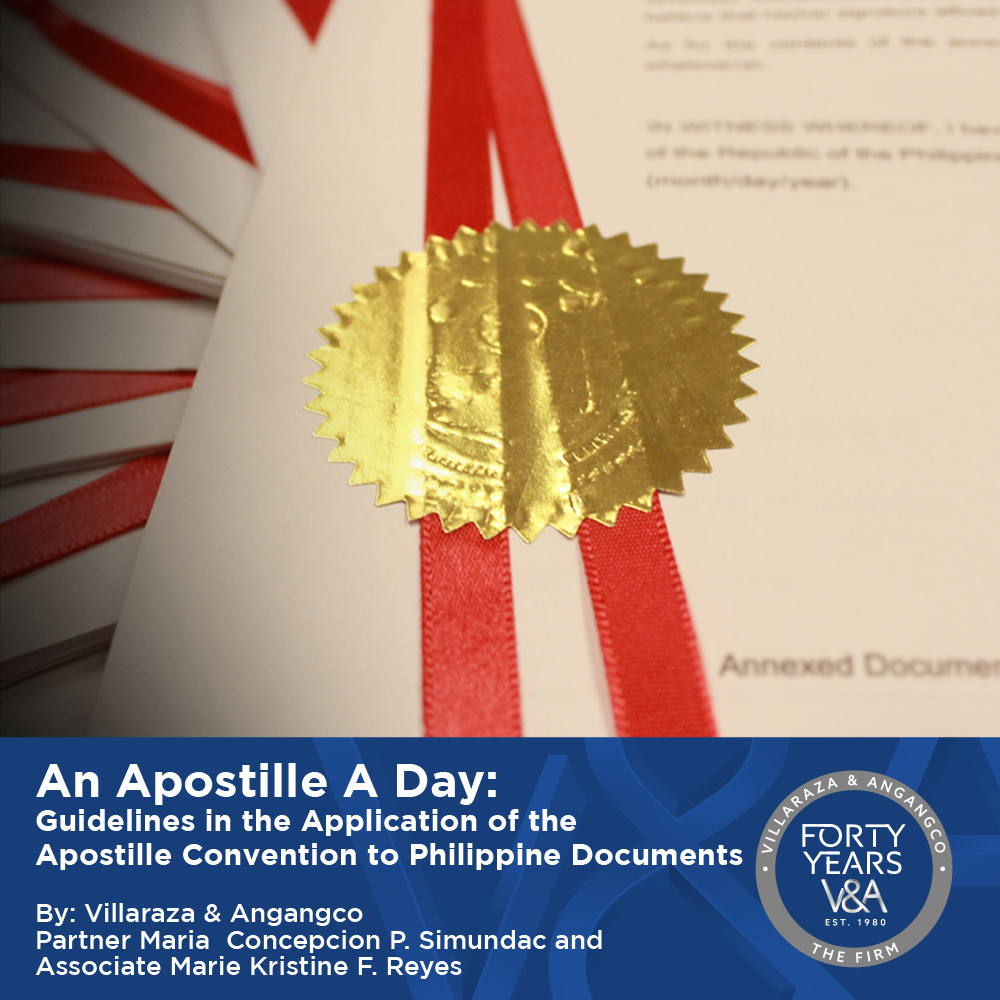
By: Villaraza & Angangco Partner Maria Concepcion P. Simundac and Associate Marie Kristine F. Reyes
The Hague Convention of 5 October 1961 Abolishing the Requirements of Legalisation for Foreign Public Documents, or commonly known as the Apostille Convention entered into force in the Philippines on 14 May 2019. Previously, the Philippines acceded to the Convention on 12 December 2018. As of 14 May 2019, the Philippines became an Apostille-contracting country, joining 116 other countries and paving the way for the greater simplification of the process of authentication of foreign public documents.
Where applicable, the Apostille Convention condenses the authentication process to a single formality – the issuance of a Certificate called the Apostille which essentially authenticates the origin of a public document (such as birth, death or marriage certificates, judgments, patents or notarial attestations) for the use in another Apostille-contracting country. The Apostille is issued by the competent authority in the country where the public document was issued.
Application of the Apostille Convention
In the application of the Apostille Convention, two (2) essential questions must be asked:
-
Is the country where public document was issued an Apostille-contracting country?
-
Is the country where the public document is to be used also an Apostille-contracting country?
Only when the two qualifications concur can the Apostille replace the previous process of authentication. Note that a country need not be a member of the Hague Conference on Private International Law to join the Apostille Convention.
As an additional qualification, if one country has acceded to the Apostille Convention, there is still a need to confirm if the other country made reservations or objected to the accession. Note that some countries made reservations to the Philippines’ accession to the Apostille Convention pursuant to Article 12, paragraph 2 of the Apostille Convention. Thus, for public documents to be used in Apostille-contracting countries with reservations to the Philippines’ accession or issued in said countries but to be used in the Philippines, the previous process of authentication with the Philippine Embassy or Philippine Consulate still applies (Red Ribbon).
Sufficiency of the Apostille
If the Convention applies, an Apostille is sufficient to establish the origin of the public document and certifies the genuineness and authenticity of a signature or seal of the authority that signed or sealed the public document and the capacity in which this was done. An Apostille is strictly for the use of public documents abroad. Thus, once a document is Apostilized, if can validly be used in any Apostille-contracting country.
An Apostille is placed directly on the public document itself on a separate attached page (called an allonge). It may be affixed by means of rubber stamps, self-adhesive stickers, seals, etc. It is sufficient to establish that a signature or seal on a public document is genuine and to establish the capacity of the person or authority that signed or sealed the public document.
Public Documents
Note that the Convention does not define “public document” and thus, the “public nature” of a document is left to be determined by the law of the place where the document originates (i.e., State of origin). Nonetheless, under Article 1 of the Convention, the following documents are deemed to be public documents: (a) documents emanating from an authority or official connected with a court or tribunal of the Contracting Party (including documents issued by an administrative, constitutional or ecclesiastical court or tribunal, a public prosecutor, a clerk, or process-server); (b) administrative documents, (c) notarial acts, and (d) official certificates.
With the Philippines’ accession to the Apostille Convention, the cost and processing period for going through the long and sometimes difficult legalization process is expected to be mitigated, resulting in ease and more convenience to Filipinos and foreigners alike.
The above article is information purposes only and is not intended to constitute legal advice.

